US Imperialism Thwarts Peace on the Korean Peninsula while Shaping a New Cold War
Simone Chun / Truthout
(July 27, 2023) — Today marks the 70th anniversary of the Korean War Armistice, which brought a cessation of hostilities between the opposing parties, but left the peninsula locked in a permanent state of war.
Article IV of the armistice stipulates: “Within three months after the Armistice Agreement is signed and becomes effective, a political conference of a higher level of both sides beheld by representatives appointed respectively to settle through negotiation the questions of the withdrawal of all foreign forces from Korea [and] the peaceful settlement of the Korean question…”
Nonetheless, the US has to this day refused to sign a permanent peace treaty or withdraw its troops from South Korean territory.
Campaigning for an end to the 70-year US military occupation of Korea and a formal end to the Korean War, thousands of South Koreans will form a human peace chain around the 3,600-acre US military base in Pyeongtaek, South Korea, on July 27. Known as Camp Humphreys, the garrison is the largest US overseas base in the world, hosting nearly 28,500 combat-ready US troops and battle-ready materiel. In solidarity, 840 Korean and international organizations are holding more than 300 peace actions around the world to call on President Biden and Congress to officially end the Korean War with a formal peace agreement.
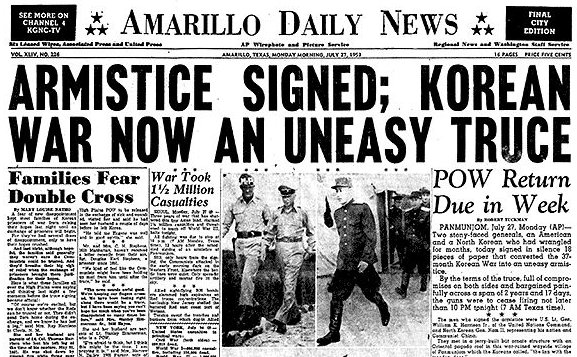
One of the organizers of the Pyeongtaek peace chain signaled that more such actions were planned for the future, stating that: “July 27 will mark the first step towards finding peace in our land on our own terms. We will spread our movement to Gunsan, Jinhae, Busan, Jeju … and will not give up until the job is done.”
The common thread in this year’s global Korea peace action is the renewed focus on the US’s role in one of the most brutal wars of the 20th century. In three years of war, the US dropped over 635,000 tons of bombs on the Korean Peninsula — more than it dropped in all WWII theaters combined. Indiscriminate carpet bombing and napalming destroyed nearly 90 percent of major cities and villages in North Korea, killing an estimated 4 million, more than half of whom were civilians.
Infrastructure was obliterated, farmlands razed, families shattered and more than 2 million children orphaned. The world’s most militarized Demilitarized Zone (DMZ) was established along the 38th parallel, permanently dividing the nation, leaving 10 million family members separated and more than 80 million Koreans living in a state of perpetual war.
According to historian Bruce Cumings, the tragedy of Korea’s division was the result of the “wrongs of high-ranking leaders of the US who carelessly and rashly divided this historical country after 1945” in furtherance of US hegemonic interests and against the will of the Korean people.
The Korean War had started as a civil war for unification, but developed into a global war as foreign powers perceived both threats and opportunities arising from this strategic theater. I.F. Stone, who framed the Korean War in the context of the global Cold War by documenting how the United States intentionally refused to let hostilities end, noted that:
The dominant trend in American political, economic, and military thinking was fear of peace. General Van Fleet summed it all up in speaking to a visiting Filipino delegation in January 1952: “Korea has been a blessing. There had to be a Korea either here or some place in the world.”
In their introduction to the new edition of I.F. Stone’s The Hidden History of the Korean War, Tim Beal and Gregory Elich argue that Stone unmasked the “ugly reality of how the United States intentionally kept the war going long past the point where either side could make any significant gains on the ground.” They continue:
The eruption of full-scale war on the Korean Peninsula presented an opportunity to advance US geopolitical interests and those of key Asian clients and put imperialism at the center of US foreign policy in Asia.… What resulted from it was to ‘supplant European and Japanese colonialism and replace it with US dominance’… inaugurating imperialism at the center of US foreign policy, with the military industrial complex at the apex.
Thus, the ongoing Korean War inaugurated the “permanent war economy” of the Cold War, setting the United States on the path to militarism and perpetual conflict. In Korea, it meant the signing of a “Mutual Defense Treaty” in 1953 between the US and South Korea that unleashed massive militarization in both the North and South; the American nuclearization of the South (1958-1991), which set in motion the North’s eventual nuclearization; building up and subjugating South Korea’s military as an appendage of US force projection; extracting more than $1 billion per year from South Korean taxpayers for the privilege of hosting Washington’s network of military bases and personnel; and reducing the South Korean nation to voiceless frontline cannon fodder in Washington’s new hegemonic “Pivot to Asia,” which is set on a deliberate course toward war with China.
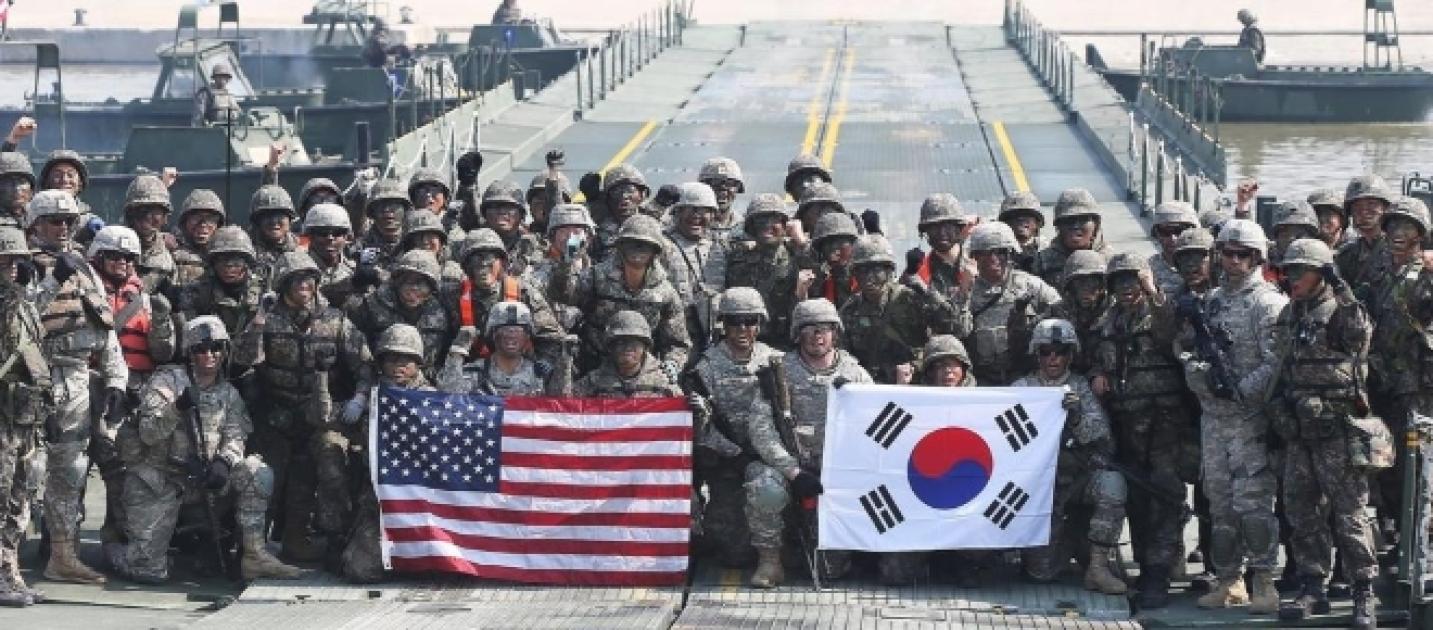
“Fear of Peace”: Biden Has Escalated Provocative War Games in Korea
Fast forward to the Biden administration, and the US’s “fear of peace” is manifested in the rapid militarization and escalation toward a kinetic new East Asian war. Washington, Seoul and Tokyo have been carrying out a series of provocative war games and drills aimed at the North, and more importantly at China, mobilizing the nuclear aircraft carrier USS. Nimitz, the Japanese Destroyer J.S. Umigiri and advanced aerial assets over Korean waters, as well as US B-52s and ground-based THAAD anti-missile systems.
These “largest-ever live-fire drills” field some 2,500 troops and 610 weapons systems near the North Korean border as well as US nuclear-armed submarines, reintroducing US nuclear weapons to South Korea for the first time since 1981.
This deliberate escalation of regional tensions is greatly facilitated by South Korea’s far right president Yoon Suk-yeol, who has systematically capitulated to Washington’s anti-China agenda against the wishes of the majority of South Koreans, and at great cost and risk to the nation. The newly minted Washington Declaration flouts South Korean national interests and public opinion by forcing the nation squarely onto the front lines of Washington’s aggressive militaristic push into East Asia.
The 70th anniversary of the Korean War Armistice is a reminder of how US imperialism has not only thwarted peace in the Korean Peninsula but is currently shaping a new Cold War that could easily spiral into a catastrophic nuclear conflict.
Japan, which has for years used the North Korean threat as cover for rearmament against China, is another driving force behind the escalation. With sustained US support, Tokyo has made great strides toward transforming into a formidable military power capable of counterbalancing China.
Its imperial ambitions intertwined with the US hegemonic quest in East Asia, Tokyo has secured Washington’s blessing for doubling military spending within the next five years, developing preemptive military strike capabilities and acquiring advanced offensive US ordnance capable of reaching targets on the Chinese mainland.

“The US Is Developing an Attack — Already Underway — on China”
With the Korean Peninsula fast becoming a focal point for a potential US-China war, I invited Noam Chomskyto examine the ramifications of Washington’s new Cold War. Speaking on the JNC TV-sponsored webinar, Chomsky voiced significant concern over heightening regional tensions.
He characterized the Korean Peninsula as a pivotal component of US hegemonic interests in East Asia, and explained that the US purposely stokes conflict because a hostile North Korea justifies the continued buildup of US military assets in South Korea, which is crucial to its hegemonic ambitions in East Asia.
In his uncompromising critique of US imperialism, Chomsky lays out Washington’s approach to confronting China, and sounds an unequivocal warning of the danger of war:
The United States is developing an attack — not impending, but already underway — on China. The military dimension includes expanding NATO, but concretely, in official terminology … “encircling China with a ring of Sentinel States,” including South Korea, leading all the way to Japan and Australia, that are heavily armed with US advanced precision weapons aimed at China … a war with China would mean the end of humanity…
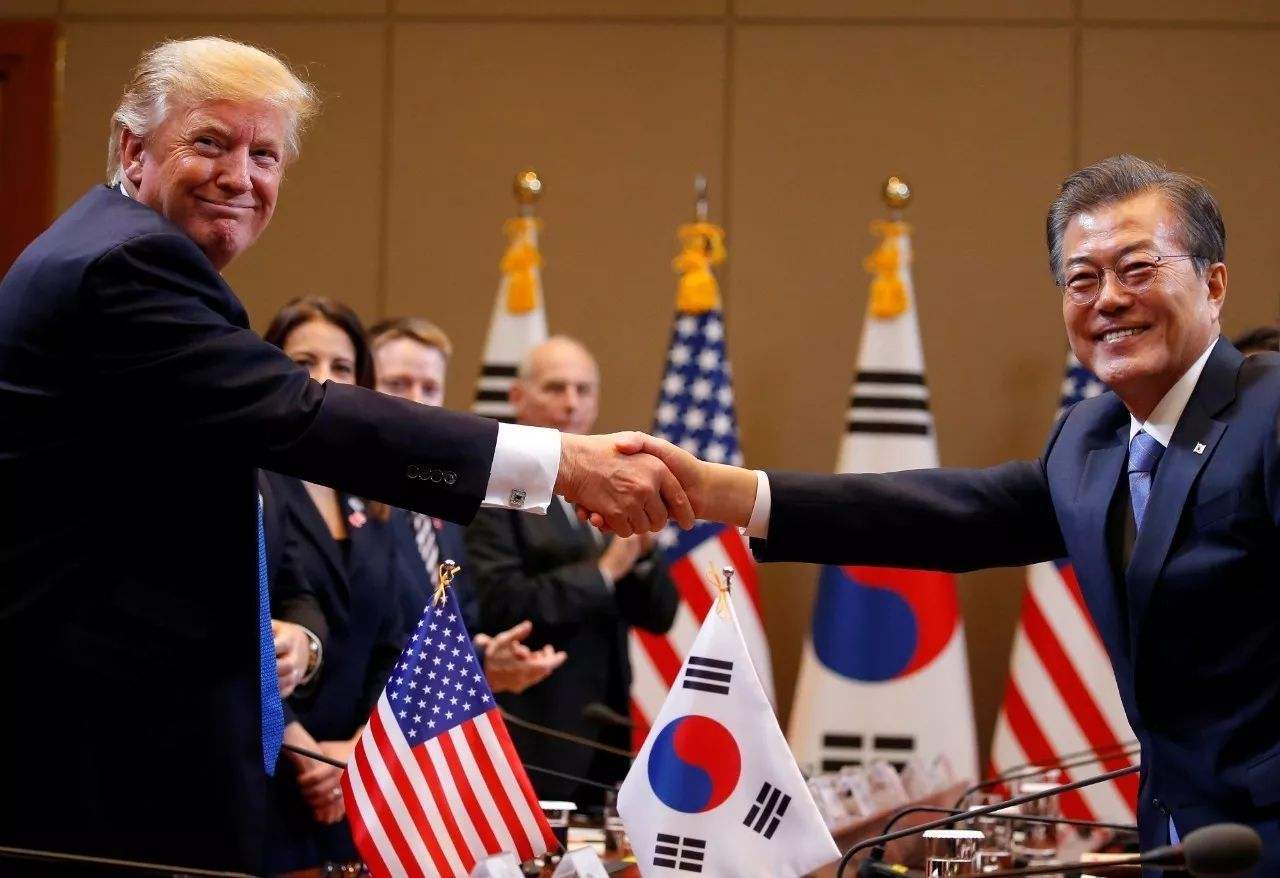
“For All of South Korea’s Existence,
It Has Been Subordinated to the US”
Commenting on the report that 80 percent of Koreans oppose Washington’s imposition of its anti-China policyon South Korea, and that Washington’s policies vis-a-vis China and North Korea run directly counter to the sentiments of the majority of South Koreans, Chomsky points out that most of the world in fact opposes the US effort to launch a major new Cold War both in Europe and in Asia:
There is a confrontation between two versions of world order: a multipolar versus a unipolar world. The multipolar world order is the UN-based world order and the “human-based order,” which is proposed by China, by the Global South and by most of the world, which the US is opposed to.
A unipolar world, which the US is in favor of, is what’s called a rules-based international order, an order in which the United States sets the rules, and if it doesn’t like the rules, it throws them out….
Most of the world is refusing to support the US effort to launch a major new Cold War both in Europe and in Asia. Most of the world just says, “No, it’s not our fight. We do not want to join in the conflict with Russia or certainly not with China.”
Chomsky points out that the new Cold War is a “severe threat,” especially against South Korea, because South Korea is “right in the middle of it” and because the US views South Korea as a “permanent military base from which troops can be available to operate anywhere.” Chomsky describes the Korean predicament as being “enlisted by being occupied … for all of South Korea’s existence, it’s been subordinated to the United States.”
In other words, Korea will inevitably be drawn into any future US-led regional conflict as a “force multiplier,” and frontline cannon fodder to further US imperial objectives in the Asia and Pacific and beyond.
According to journalist and activist K.J. Noh, Korea’s inevitable co-option into US-led wars evinces its near-complete loss of sovereignty and more specifically, US domination and control of the South Korean military.
Pointing out that the US has had continuous wartime Operational Control Authority (OPCON) in South Korea for 73 years, Noh argues that the Pentagon maintains de facto and de jure control of one of the largest and best-equipped militaries in the world, inclusive of some 600,000+ frontline Korean troops and 3.1 million reservists, as well as all military bases, weapons and infrastructure in South Korean possession.
These combined forces and materiel are not intended to bolster the US’s defensive posture for the benefit of South Korea, but in fact form a “US imperial force” and “threat projection platform” deployed on a de facto US outpost, providing a forward military presence on the Asian mainland.
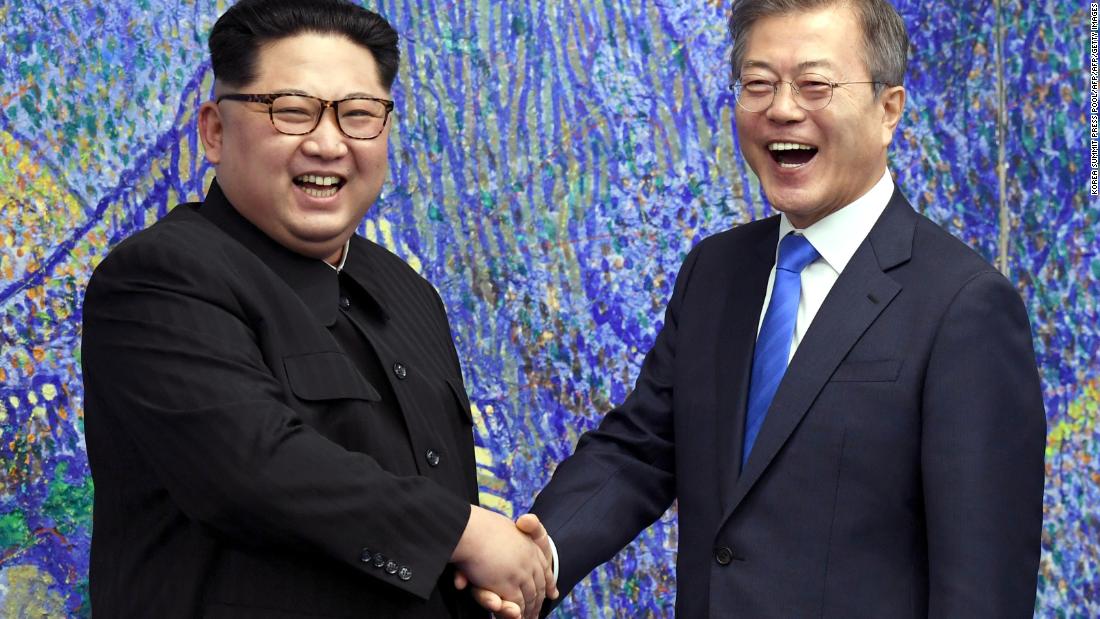
“The Major Step Has to Be a Peace Treaty”
Chomsky identified a formal peace agreement between the two Koreas and the restoration of South Korea’s sovereignty as crucial conditions for peace in the Korean Peninsula. Korean sovereignty, he stressed, must be regained on Korea’s own terms, adding that a “a peace treaty is a major step toward achieving such a goal,” without which South Korea remains an “occupied country”:
With regard to Korea, the major step has to be to move towards a peace treaty, as North Korea has been requesting for a long time. The US has been rejecting it, but as long as there’s no peace treaty between the South and the North, South Korea is an occupied country.
In the absence of a peace treaty, it will remain so. It is in the interest of all the people of Korea to move towards a peace agreement, and there’s every reason to believe that it’s possible…. This is an issue that will have to be resolved in South Korea, and it won’t be easy.
The question is whether South Korea wants to remain subordinated to the United States or join most of the rest of the world in moving towards a global order with independent sources and centers of control, not just the United States … but that’s a decision that needs to be made in South Korea.
Regaining sovereignty, unity and peace based on the principles of self-determination will not be easy. On the one hand, the US will not willingly end its occupation of South Korea, and, on the other, according to Chomsky: “the North Korean threat provides justification for the right-wing conservative regime in the South. Relaxation with North Korea would mean conservatives losing power in the South.”
Indeed, one of the biggest current obstacles for inter-Korean peace is the “liberal” Biden administration’s support for the extreme far right administration of Yoon Suk-yeol, who is eager to prove his administration’s worth as a linchpin in Washington’s new Cold War in Asia.
While Yoon’s regime has been rankled by approval ratings as low as 22 percent and widespread protests against endemic domestic crackdowns as well as dangerous brinkmanship with the North, Yoon’s “republic of prosecution” enjoys Washington’s support as long as it eagerly toes the line of US hegemonic unipolarity.
Lauded as the “perfect US partner,” the Yoon administration has doubled down on internal repression while importing seven times more US weapons in its first year than in the last five years combined. Biden’s bolstering and militarization of the repressive Yoon regime harkens back to Washington’s sordid history of propping up the brutal military dictatorship in South Korea, and what Chomsky refers to as the institutionalization of sub-fascism under US tutelage.
On the Anniversary of the Armistice
Agreement, US Imperialism Must End
The 70th anniversary of the Korean War Armistice is a reminder of how US imperialism has not only thwarted peace in the Korean Peninsula but is currently shaping a new Cold War that could easily spiral into a catastrophic nuclear conflict. Washington’s imperialism — the “central characteristic of US foreign policy” — is making the Korean Peninsula into the most dangerous place in the world.
During the most intense period of inter-Korean rapprochement under the 2002-2007 Roh Moo-hyunadministration, Chomsky pointed out that the global and historical significance of peace in Korea goes beyond the immediate task of reducing regional tensions:
“Progress on the Korean Peninsula is a turning point in 500 years of Western rule … creating a new paradigm that leads to independence through unity and integration [by] overcoming the structure of division and disintegration, which was the typical method of aggression, domination, and governance by Western and American colonialists for five centuries.”
Opposing US imperialism and brinkmanship in Korea and throughout the Asia-Pacific region is more important than ever. The US peace movement must make opposition to US imperial policy a focal point of its struggle, and support South Koreans as they campaign to regain their sovereignty and independence, end Korea’s neocolonization by the United States and regain control of their destiny.
Copyrigh © Truthout. Reprinted with permission
Truthout note: We desperately need your help to fuel this independent news platform. Please do what you can!
!

